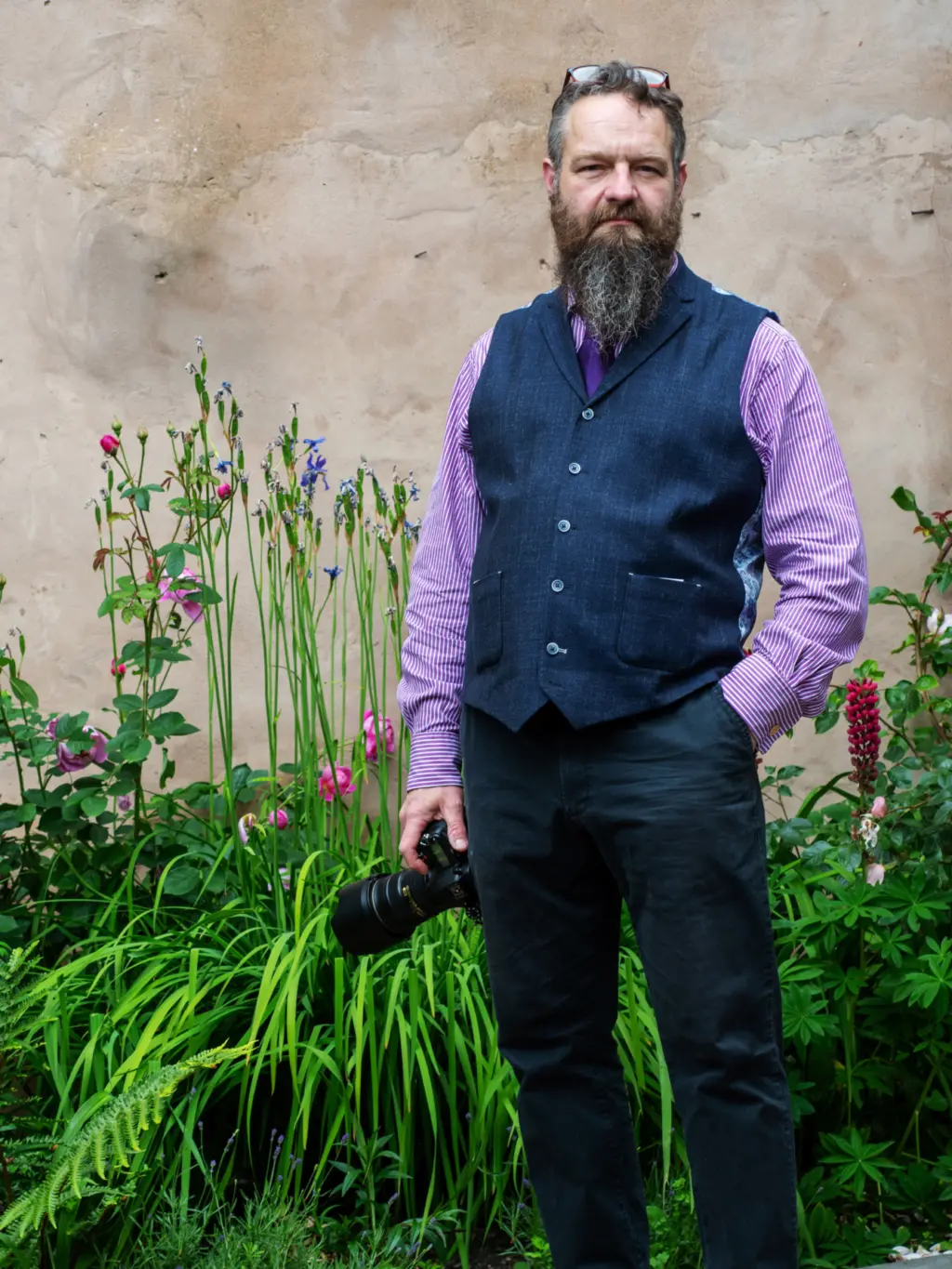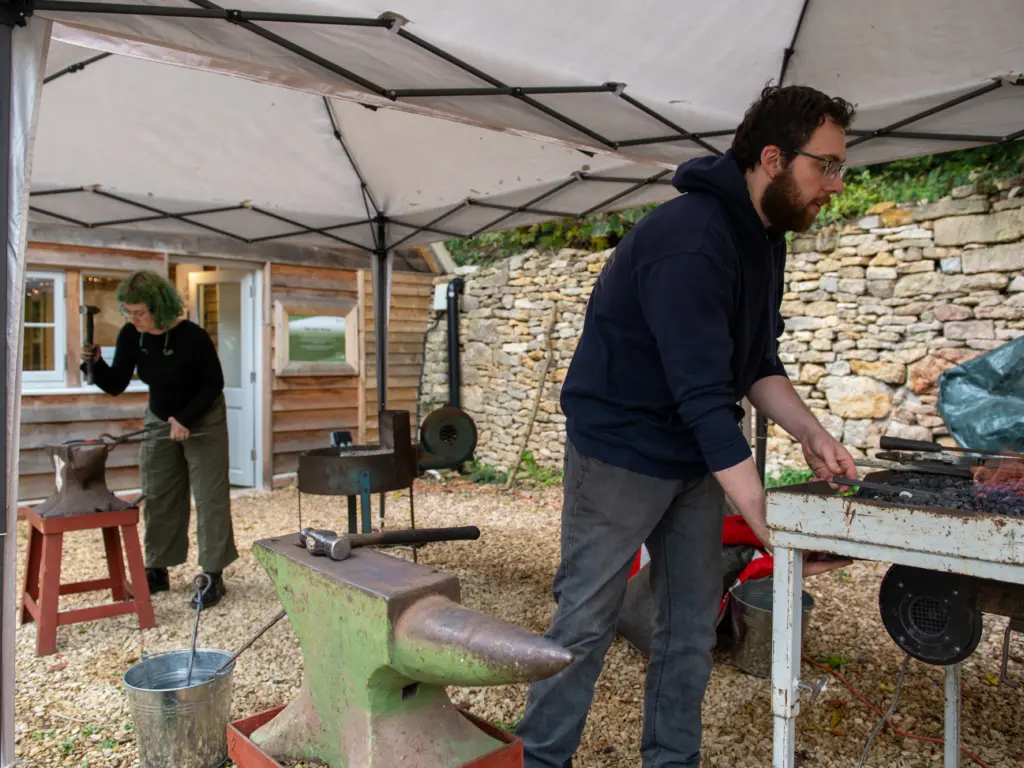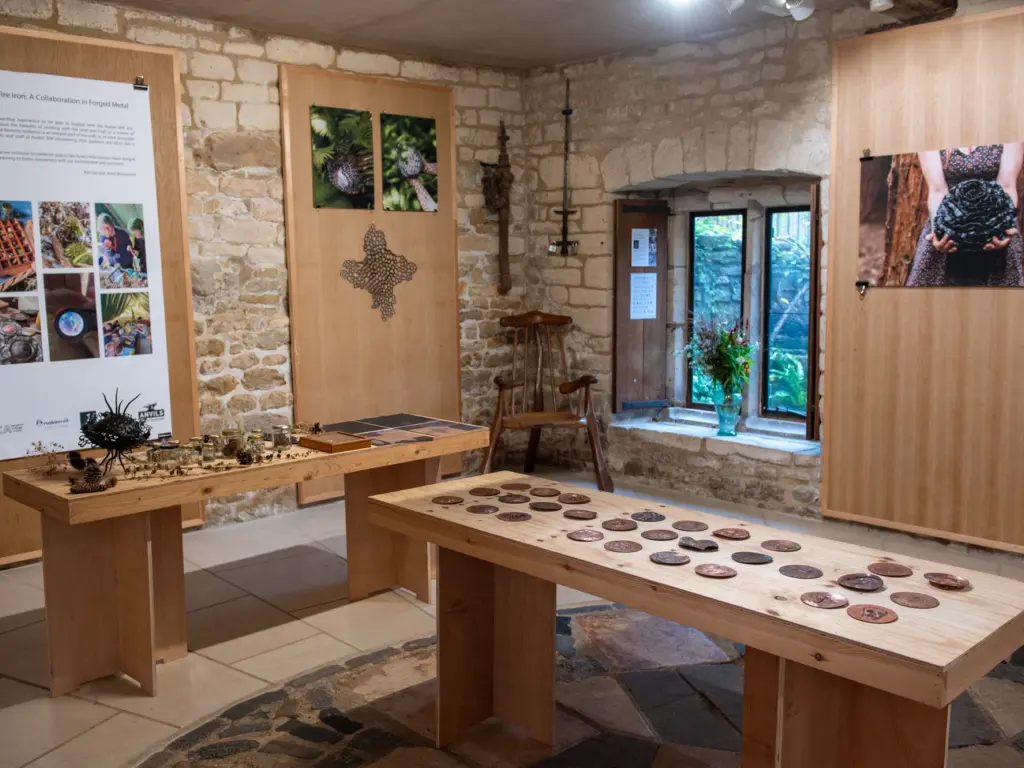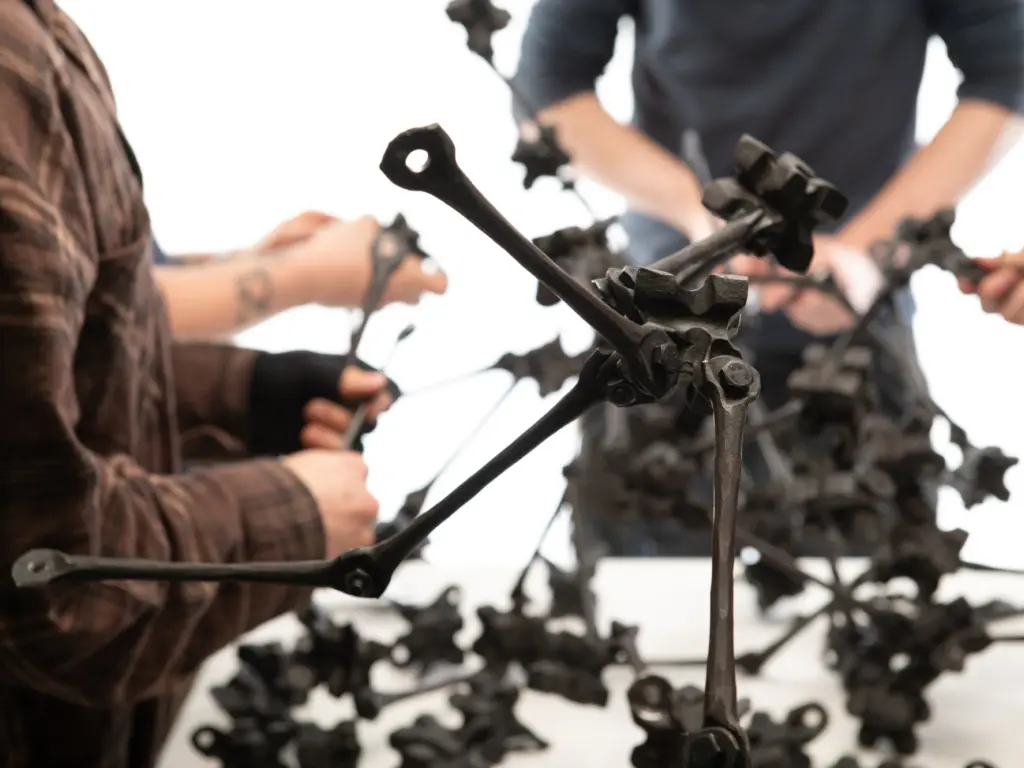- Home
- A-Z of courses
- MA Forged Metal Arts
MA Forged Metal Arts
-
Duration
15 months
-
Cost
£9,000

Challenge conventions in contemporary forged metal with our pioneering Master's Programme in Forged Metal Arts. Develop a body of work grounded in a robust theoretical framework. Establish a renewed, authentic practice and contribute to the evolving discourse in this expanding field of material process.
Overview





Modules
This module serves as your introduction to studying at the master’s level. Through a series of seminars and workshops, you will explore how to identify and mobilize ideas within craft practice. You will also learn and apply research methods essential for critically analysing images, objects, and texts related to craft.
All activities and tasks are designed to help you clarify your study direction. The module culminates in a written MA research proposal, where you will contextualize your project, articulate your research aims and objectives, and outline your scheme of work.
In this practice-based module, you will utilize studio facilities and workshops to explore and develop your research project idea. You will have the opportunity to experiment with materials, processes, and design concepts relevant to your project.
Throughout the module, you will document your methods, record and annotate your samples, and critically reflect on your processes and outcomes. By engaging with relevant visual, material, and academic sources, you will further inform, clarify, and contextualize your project.
In the Advanced Practice module, you will further refine the direction of your study by selecting and honing your designs, samples, skills, and outcomes. By the end of the module, you will produce a cohesive body of work that effectively addresses your project intentions and aims. Throughout this process, you will engage in reflective practice and critically interact with academic sources to inform and articulate your Master’s project.
In this module, you will engage in professional development through seminars, workshops, talks, visits, and peer-to-peer knowledge sharing. You will identify, explore, and reflect on your professional practice goals and values. Additionally, you will propose and independently
complete a professional practice project of your choice that aligns with your chosen goals. This module focuses on developing the professional skills necessary to sustain your individual creative practice. The outcome will be an illustrated report that describes, situates, and critically reflects on your professional practice project.
This module consists of two key components: the creation of final craft outcomes that align with your project intentions, drawing on the knowledge, skills, and experiences acquired throughout the programme, and the production of an illustrated reflective paper that contextualizes and critically articulates your Master’s project. This paper integrates both theoretical and practical aspects, providing an academic underpinning that offers insights into your creative process and the evolution of your ideas. It serves as the culmination of your studies and the resolution of your practice-based project.
You will present your work to an audience and participate in an exhibition, enhancing the critical discourse surrounding your study and demonstrating the practical application of your craft. This
showcase provides invaluable opportunities for networking and feedback from peers and industry professionals, further enriching your academic and practical journey.
How you will learn
Professional Development

- School of Materials and Design
Del Done MBE,CWCB
Head of the School of Materials and Design and Course Leader for BA(Hons) Artist Blacksmithing, MA Forged Metal Arts, and MA Contemporary Crafts

- School of Materials and Design
Lisa Porch
Lecturer - MA Contemporary Crafts & MA Forged Metal Arts

- School of Materials and Design
Maxwell Anderson
Lecturer - BA(Hons) Artist Blacksmithing

- School of Materials and Design
Rebecca Finney
Lecturer - School of Materials and Design

- School of Materials and Design
Ruth Cameron-Swan
Lecturer - BA (Hons) Artist Blacksmithing

- School of Materials and Design
Henry Pomfret
Lecturer - BA(Hons) Artist Blacksmithing

- School of Materials and Design
Dr. Oliver Cameron-Swan
Lecturer - School of Materials & Design

- Technical Demonstrator
Bronwen Tyler -Jones
Workshop Manager

- Technical Demonstrator
Jess Bulger
Print making

- Technical Demonstrator
Bryony Burn
Ceramics Specialist

- Technical Demonstrator
Tom Hancock
3D Material processes

- Technical Demonstrator
Jo Harvey
Ceramics Specialist

- Technical Demonstrator
Becky Roberts
Textiles & 3D processes
Course News

- Craftsmanship & Fabrication
- News
- Postgraduate
- Blacksmithing
- School of Materials & Design
Embracing the power of forged metals at Hereford College of Arts new master programme
6 mins read time

Hawkwood College Artist Residency
1 min read time

A Collaboration in Forged Metal artist residency
1 min read time

- News
- Prototyping and Physical Design
- Craftsmanship & Fabrication
- Awards
- Undergraduate
- Blacksmithing
- School of Materials & Design
Cameron Pearson wins New Designer of the Year award 2025
3 mins read time
A key moment for the discipline

We're delighted to see the launch of this pioneering Master's Programme in Forged Metal Arts. Complementing the acclaimed BA in Artistic Blacksmithing, this new MA represents a significant milestone in contemporary craft. A unique opportunity for artists to further their practice, reimagining metalwork by forging tradition with innovation to create pieces that truly resonate with authenticity and purpose. At Cox London, we eagerly anticipate the new voices and visionary ideas that will surely emerge from this exceptional collective journey.
Chris Cox - Creative Director and Co-founder, Cox London

I am thrilled to see the introduction of the new MA Programme in Blacksmithing. This programme represents a remarkable opportunity for professionals in the field to elevate their craft to new heights. The programme will tackle the challenges of advancing the blacksmithing craft while identifying ways in which it can remain relevant in today's society.
Heiner Zimmermann - Professor Metal Art, University of Gothenburg and HDK – Valand Campus Steneby & HCA Honorary Fellow

The establishment of the first MA Forged Metal Arts programme marks a pivotal moment in the UK’s educational and artistic landscape. It signifies a profound recognition of metal arts as a distinct and essential discipline. The academic underpinning will foster a new generation of artisans who will both preserve and innovate within this venerable craft.
Andrew Rowe - DAR Design Limited and Chair of British Artist Blacksmithing Association

Forging is experiencing quite the resurgence as a way for individuals to express themselves creatively in three dimensions. Because of this it thrills me to see the establishment of a master’s degree in forging at the Hereford College of the Arts. In a craft with such strong ties to the past and an exciting future on the horizon, it’s programs like this that help keep this time-honoured practice alive and give forging relevance in the modern world. A post graduate MA in forged metal arts at HCA is sure to raise the bar for quality and creativity helping to inspire professionalism in smiths all over the world
Pat Quinn - Center for Metal Arts Executive Director, Johnstown, Pennsylvania, USA

The news of the first MA Forged Metal Arts programme at Hereford College of Arts is such welcome news. As craft courses at higher education level are under pressure, to see a new course develop at such a high level is hugely encouraging and heartening for the future of making.
Sarah James MBE, Craft Festival Director
Workshops & Resources

Individual studio space
You have your own studio space; where ideas are made real and lasting connections are made. Filling its walls compliments reflective book work, driving the design process forward; current thinking made visible through drawn and made tests. Studio culture is essential to the success of your design and make projects.
Book an Open Day
Forges
The National School of Blacksmithing boasts forty-two side blast coke forges where you are taught the fundamentals of blacksmithing. There are also propane forges for working longer sections with more consistent heat control. The Tutors at the National School of Blacksmithing bring over 150 collective years of forge experience.
Book an Open Day
Forge equipment
The National School of Blacksmithing provides four power hammers, a 25-ton hydraulic press, four fly presses, a large bandsaw, a cropper and two laying out tables. In addition to top and bottom swages, fullers, flatters, set hammers and a wide range of tongs including a variety of power hammer tooling. You are also taught how to safely use angle grinders with various attachments, oxy-acetylene and oxy-propane gas torches.
Book an Open Day
Welding
The Welding department at the National School of Blacksmithing allows for a variety of techniques to be taught including TiG, MiG/MAG, ARC/Stick, Gas, and Brazing These processes are taught in structured lessons to expand your skills and understand selecting the correct process.
Book an Open Day
Fabrication
The Fabrication tools you have access to at the National School of Blacksmithing include sheet metal benders, rollers, and a scroll jenny. The department has a large CNC Laser cutter which can cut up to 12mm thick plate, a large and small cropper, vertical and horizontal bandsaws, a hand plasma cutter, and a die grinder.
Book an Open Day
Library
A dedicated art and design library carefully curated by knowledgeable librarians who will support you to access the materials in the collection. Includes books and magazines from a comprehensive selection of creative disciplines, critical & cultural theory and specialist journals. Plus, study spaces and IT provision. A college hub and key workshop area.
Book an Open Day
Digital Skills Centre
Opened in 2024 our Digital Skills Centre is an alternative space to the Graphic and Media Design Studios to craft your designs. Kitted out with new Macs and PCs, the area is staffed by Digital Demonstrators who also run weekly intro and How To classes on design software.
Book an Open Day
Queens 3D Workshop
In the Queens workshop, you can explore and experiment with various materials and processes in a well-equipped space. The facilities include small metals, wood, cold casting, 3D printing, and MDF/Plywood laser cutting, as well as welders and jewellers' benches. Techniques you can learn include woodturning, steam bending, resin and Jesmonite casting, various welding processes, 3D printing, vinyl, and veneering. Skilled Technical Demonstrators support your learning, ensuring a comprehensive experience.
Book an Open Day
Zones in the 3D workshop
The Queens workshop is divided into four zones: Metals (jewellery, silversmithing, machining, welding, fabrication), Woodwork (steam bending, lamination, woodturning), Cold Casting (silicone mold making, jesmonite, resin), and Digital Fabrication (scanning, laser cutting, 3D printing).
Book an Open Day
Small Metals
The Small Metals workshop has fully equipped communal and individual workspaces to practice your bench skills. The workshop is equipped for a variety of specialist processes and has two larger silversmithing hearths. The walls are adorned with process samples for inspiration, and the space is overseen by highly skilled Technical Demonstrators.
Book an Open Day
Ceramics & Glass
The Ceramics and Glass workshop offers an opportunity to explore the tactile nature of clay and the artistry of glass cutting, fusing and slumping. You can develop skills in slab building, slip casting, and throwing, either for conceptual art or commercial projects. Technical demonstrators are available to guide you through all processes.
Book an Open Day
Textiles
Our textiles workshops provide an open and accessible space to explore print, dye, weave, knit, and mixed media surface design techniques. Focusing on sustainability and innovation, you’ll combine methods from across various disciplines, pushing your creative boundaries throughout your degree. The technical support, along with academic and industry guidance, encourages you to develop an original, innovative design practice.
Book an Open Day
Digital Design
Digital Design and Making is embedded into both curriculum and your practice. Offering the ability to test possibilities, accelerate iterations and resolve outcomes efficiently. The use of digital tools allows makers to visualise, prototype and refine project work across a range of materials and processes in additive and subtractive manufacturing.
Book an Open Day
Photography
Our photography studios and darkroom facilities offer extensive opportunities to gain hands-on experience with both digital and traditional techniques. You will acquire invaluable skills ensuring you take superb photos of your creative process and final outcomes. Work alongside professional photographers and technical specialists to get outstanding images of your work.
Book an Open DayApplication process
Applicants are expected to possess a solid understanding of their chosen discipline, demonstrating the ability to engage in research at the Master’s level. While preference will be given to graduates with good honours degrees, the programme also welcomes exceptional candidates from non-academic backgrounds who are looking to reposition their practice. These individuals may qualify based on their unique experiences and perspectives.
The application process includes a short proposal that should clearly outline the applicant’s reasons for applying to the programme, reflecting their motivations and aspirations. Additionally, a portfolio showcasing their current practice is required, as this will serve as the basis for discussion during the interview process.
Overall, the programme seeks candidates who are not only academically qualified but also passionate about their field and eager to contribute to the academic community.
Interviews for the programme are typically conducted face-to-face with a member of the course team, although online options can be arranged if necessary to accommodate your needs. This informal, two-way conversation lasts about 30 to 45 minutes and is designed to focus on your Master’s proposal. It provides a valuable opportunity for you to share your creative vision, articulate your motivations for pursuing this advanced study, and discuss how your background and experiences have shaped your artistic journey.
During the interview, you will also have the chance to engage with current students, gaining insights into their experiences and the collaborative environment of the programme. Additionally, a tour of the campus will allow you to explore the workshops and facilities available, giving you a sense of the resources at your disposal.
When preparing for your interview, consider bringing items that showcase your proposal, such as completed works, designs, or even works in progress. While a formal portfolio is welcome, it is not essential; we are more interested in understanding what inspires you and how you envision your journey in the Master’s programme. This is your chance to express your passion and creativity, so come prepared to discuss your ideas and ask any questions you may have about the course.
Postgraduate Open Days
Find out first-hand why students rated HCA among the top institutions in the UK at an Open Day.
Book your place at an upcoming Open EventPostgraduate
Information on course fees and funding opportunities for HCA's post-graduate courses
Find out more about student finance for postgrads


